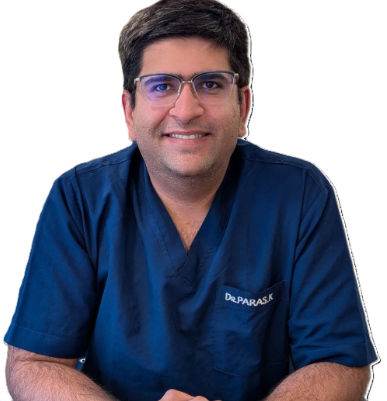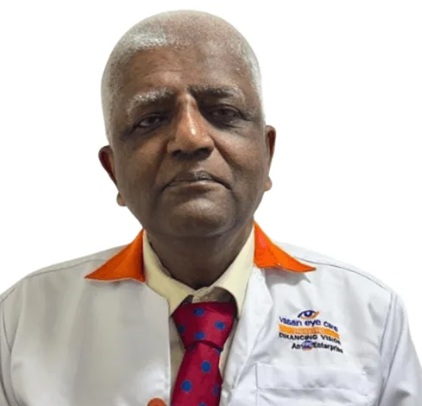Smile Eye Surgery: Full Form, Side Effects, Recovery, Result
Dr. Aman Priya Khanna

Treatment Duration
20 Minutes
------ To ------29 Minutes
Treatment Cost
₹ 1,20,000
------ To ------₹ 1,85,000

Table of Contents
- What is SMILE Eye Surgery?
- Conditions Treated with SMILE Surgery
- How is SMILE Eye Surgery Performed?
- Before and On the Day of SMILE Eye Surgery
- What to Expect after SMILE Surgery
- Risks and Complications of Surgery
- Benefits of SMILE Eye Surgery
- Risks of Delaying a Procedure
- Cost of SMILE Eye Surgery
- Conclusion
Step into a world of sharp, clear vision with SMILE laser surgery! Imagine saying goodbye to glasses and contacts as a gentle laser reshapes your cornea, enhancing your sight.
This revolutionary procedure offers a quick recovery and minimal discomfort. Get ready to embrace a life of visual freedom and clarity like never before! Read about SMILE eye surgery to know in detail.
Surgery Name | SMILE Eye Surgery |
Alternative Name | Small Incision Lenticule Extraction Surgery |
Disease Treated | Myopia, Hypermetropia, Astigmatism |
Benefits of the Surgery | Minimally invasive, No stitches, Quick recovery |
Treated by | Ophthalmologist |
You can check Smile Eye Surgery Cost here.
What is SMILE Eye Surgery?
SMILE (Small Incision Lenticule Extraction) eye surgery is a cutting-edge procedure for vision correction. It involves using a laser to reshape the cornea, the eye's front surface, to improve focus and reduce the need for glasses or contacts.
This technique has gained popularity due to its minimally invasive nature and fast recovery times. It's considered a safe and effective option for those seeking clearer vision without the hassle of traditional eyewear.
Anatomy of the Eye
The human eye helps us to see. It comprises various parts that work together to capture, focus, and send light signals to the brain, which we perceive as images. Following is the detail of the eye structure:
Cornea: This is the clear, curved outer layer of the eye. It bends and guides incoming light towards the retina.
Iris: The part around the centre, or pupil, controls the light entering the eye. It makes the pupil smaller in bright light and larger in dim light.
Pupil: The dark spot in the centre of the eye, allowing light to enter and reach the lens.
Lens: Positioned behind the iris, this see-through and flexible part concentrates light onto the retina. It adjusts its shape to focus on objects at various distances.
Retina: This innermost layer contains cells (rods and cones) that detect light and transform it into electrical signals.
Expert Doctors (10)
NABH Accredited Hospitals (10)


Conditions Treated with SMILE Surgery
For people with particular refractive problems and who meet certain criteria, the SMILE is a safe and effective choice. The following people are condition treated by this surgery:
Myopia (Nearsightedness): It is a condition in which distant things look hazy.
Astigmatism: Patients with astigmatismare characterised by an irregularly shaped cornea that causes distorted or impaired vision.
Hypermetropia (Farsightedness): It is a condition in which the light is refracted incorrectly.
Presbyopia: This is caused by the hardening of the lens inside the eyes. It is an age-related problem.
Who needs SMILE Surgery?
Like any other surgery, SMILE surgery is most effective when done under certain guidelines. These include :
The age of the patient should be 22 years or more.
The eyes and the cornea should be in healthy condition
The eye power should remain the same over a year, indicating the stability of the eyes.
The myopia levels should be between -1 and -10D (Dioptre- Unit of refractive power).
Astigmatism should be less than 3 Dioptres.
How is SMILE Eye Surgery Performed?
The procedure contains precise stages carried out with the help of a femtosecond laser (a modern and highly effective laser treatment for the eyes). Here is a thorough description of how SMILE Eye Surgery is performed:
Creating a Tiny Incision: A small, precise incision on the surface of the cornea creates a tiny flap.
Reshaping the Cornea: Using a special laser, the eye surgeon gently reshapes the cornea from within, adjusting its curvature to improve focus.
Removing Tissue: The laser creates thin layers within the cornea, forming a small lenticule.
Lenticule Removal: This lenticule is then removed through the small incision, changing the cornea's shape and correcting vision.
Before and On the Day of SMILE Eye Surgery
There are crucial measures to take before and on the day of SMILE eye surgery to guarantee a successful procedure. This assessment aids the surgeon in choosing the best strategy for SMILE eye surgery.
Before SMILE Eye Surgery
Here is the information before SMILE Eye Surgery you need to follow:
Consultation and Evaluation: The surgeon will perform a complete eye examination to determine whether the patient is a good candidate for the procedure.
Medical History: The patient must disclose their medical history, which includes any pre-existing eye diseases, allergies, medications, and past eye procedures.
Discontinue Contact Lens Use: Patients who wear contact lenses will be recommended to stop wearing them for a particular period prior to surgery. Contact lenses can change the curvature of the cornea. Therefore, taking them out allows for precise preoperative measurements.
Instructions and Preparation: The eye surgeon will provide the patient with complete preoperative instructions. This will include refraining from wearing cosmetics and using eye creams or facial lotions on the day of the surgery.
On the Day of SMILE Eye Surgery
Arrival at the Surgical Centre: The patient must arrive at the hospital on time.
Preparing for Surgery: The patient will be escorted to a preoperative area and given anaesthetic eye drops for certain numbness on the surface of the eye. This guarantees that the patient's procedure is painless and comfortable.
Entering the Operating Room: The patient will be brought to the operating room for the SMILE surgery. The surgical team will ensure that the patient is appropriately positioned.
What to Expect after SMILE Surgery
Adequate postoperative care is critical for a quick recovery and the best vision correction results. Here's what patients might expect during their recovery.
The Recovery Process in the Hospital
Postoperative Care: Following surgery, the patient will be watched for a brief amount of time to ensure there are no immediate issues. The patient may have moderate discomfort or dryness, which can be treated with prescribed eye drops.
Discharge and Recovery: Once the surgeon is satisfied with the initial outcomes and the patient is stable, they will discharge the patient. The doctor will provide postoperative instructions to be followed at home.
Recovery Process/Expectations after Hospital Discharge
Wound Care: Following SMILE Eye Surgery, the eye surgeon will provide specialised wound care and eye hygiene recommendations.
- Do not rub or touch the eyes while they are healing since this might disturb the incision and cause difficulties.
- Wear protective eyewear, such as sunglasses, as directed by the surgeon to protect the eyes from strong lights and dust.
Rest and Recovery: Patients should rest and avoid strenuous activity for the first few days following the surgery. It will help to heal if one avoids certain activities that can strain the eyes.
Recommended Eye Drops: The eye surgeon will prescribe eye drops to prevent infection and improve recovery. Patients must adhere to the prescribed timetable for administering these eye drops.
Avoid Rubbing Eyes: Patients should avoid rubbing or scratching their eyes during recuperation. Rubbing the eyes can interrupt the healing process and increase the risk of infection.
Follow-Up Appointment
After the SMILE eye surgery, the first follow-up appointment on time is crucial. It ensures that the healing is appropriate and allows the healthcare providers to check for complications and the success of the surgery.
The initial follow-up appointment is normally scheduled during the first 24 to 48 hours after surgery.
The follow-up appointments allow the patient to discuss their eyesight progress and any persistent visual difficulties.
Examination of the eyes is done to check the recovery and ensure no signs of problems.
The follow-up visits are frequently arranged in the first, second, and subsequent weeks following surgery.
Risks and Complications of Surgery
SMILE surgery is usually considered secure and successful. However, it does have certain possible dangers and complications, just like any surgical operation. The following are the complications of SMILE eye surgery:
Dry Eyes: Some patients may suffer temporary dryness or pain in their eyes after surgery.
Infection: Although uncommon, there is a slight risk of infection following surgery.
Corneal Haze: In some situations, a transient haze may form on the cornea following surgery, impairing vision clarity. This is more common in patients with more refractive defects.
Irregular Astigmatism or Visual Aberrations: In a few cases, patients may develop irregular astigmatism or visual aberrations, affecting vision quality.
Pain and Discomfort: While most patients experience minor discomfort during recovery, some may feel temporary mild pain or sensitivity in the eyes.
When to See a Doctor?
Other than pre-operative and post-operative follow-up, it is essential to consult the doctor to treat complications on time and ensure complete results from the procedure. One must see a doctor in case of:
Major vision changes
High-intensity pain in the eyes
Persistent dryness of the eyes
Signs of any infections or other complications
Benefits of SMILE Eye Surgery
SMILE Eye Surgery is one of the most effective procedures for correcting eye-related problems. Some benefits are as follows:
Non-Invasive Procedure: It is a minimally invasive approach. It requires a small incision that reduces the complications of dry eyes and infections.
Reduced Discomfort: With minimal disruptions to corneal nerves, the recovery process is easy.
Quick Recovery: As compared to LASIK treatment, SMILE Eye Surgery provides quick recovery. There are also no risks of flap-related complications in this surgery.
Suitable for Many Eye Conditions: SMILE Eye Surgery can treat multiple refractive errors. These include astigmatism, myopia, and other refractive errors.
Effective Results: SMILE Eye Surgery has been known to be highly beneficial in providing patients with satisfactory results. It also corrects their vision-related problems in the long run.
Risks of Delaying a Procedure
One needs to remember that SMILE surgery can impact one's vision and quality of life. Some of the risks of delaying a procedure include:
Deterioration of Vision: If vision correction is required, delaying the surgery might result in further deterioration of the eyesight.
Refractive Error Progression: If uncorrected, refractive errors such as myopia (nearsightedness), hyperopia (farsightedness), or astigmatism can worsen with time. This will demand more severe correction later on.
Cost of SMILE Eye Surgery
The price of SMILE Eye surgery can be between ₹50,000 to ₹80,000 for each eye. The expense changes due to the following factors:
Consultation Fee: The cost might include the fee for the initial meeting with the eye specialist.
Admission Fee: This fee could contribute to the total price if any hospital stay is required.
Patient's Health Condition: The complexity of the individual's health can impact the overall expense.
Hospital Type: Different types of hospitals can have varying charges for surgery.
Location or City: The cost may differ depending on where the surgery occurs.
Patient's Age: Age could be a factor, as the surgery's impact might vary with different age groups.
Diagnostic Tests: Tests conducted before the surgery might be included in the cost.
Possible Complications: Any additional treatments needed due to complications after the surgery might add to the cost.
Procedure Name | Cost Value |
SMILE Eye Surgery | ₹ 50,000 to 80,000 per eye |
Conclusion
The SMILE procedure is still relatively new, so only a few people have undergone it. One of its advantages is the small incision in the cornea. Recovery of sensation in the cornea happens faster after SMILE, and dry eyes tend to improve more quickly after this procedure compared to LASIK. Overall, SMILE has shown positive outcomes and is a valuable method for correcting vision.
At HexaHealth, we are committed to your success. We are here to support you at every step if you have questions regarding SMILE surgery. Speak with one of our experts right away.
Suggested Reads
Frequently Asked Questions (FAQ)
What is SMILE eye surgery?
SMILE eye surgery is a minimally invasive laser eye surgery designed to correct myopia and astigmatism. It involves using a femtosecond laser to create a thin lenticular (a disc-shaped piece of tissue) inside the cornea. The surgeon removes the lenticule through a small incision, reshaping the cornea.
What is the purpose of SMILE eye surgery?
SMILE surgery is a kind of refractive surgery aiming to improve a person's visual acuity without the need for glasses or contact lenses. The purpose of this surgery is to treat :
Myopia
Astigmatism
Presbyopia
Hypermetropia
What does the acronym "SMILE" stand for in smile eye surgery?
The SMILE surgery full form is "Small Incision Lenticule Extraction”. This is one of the most modern and effective eye correction treatments.
Is SMILE eye surgery a safe procedure?
Yes, SMILE eye surgery is a safe procedure. Some of the aspects that contribute to the safety of SMILE eye surgery are as follows:
SMILE is a minimally invasive technique compared to regular LASIK (Laser-Assisted In Situ Keratomileusis).
Compared to other procedures, such as LASIK, which includes producing a corneal flap, SMILE surgery preserves more of the cornea's structural integrity.
Who is a good candidate for smile eye surgery?
A candidate's suitability for SMILE eye surgery is determined by several parameters. A competent ophthalmologist or refractive surgeon will perform a thorough eye examination and assessment to establish if a person is a good candidate for the operation. A good candidate must be:
22 years of age or older
Have nearsightedness and astigmatism
The corneas should be healthy
There are no significant changes in their prescription in a year
Who should not get SMILE Eye Surgery?
While SMILE eye surgery is generally safe and beneficial for many people, there are some circumstances in which the practice should be avoided. SMILE surgery is not ideal for people with :
Breastfeeding and pregnant women
People with severe glaucoma
People with scars on the cornea
Uncontrolled diabetes
Vision problems due to cataracts, etc.
Can smile eye surgery correct astigmatism?
Yes, SMILE eye surgery can correct astigmatism. SMILE is a flexible refractive technique to address various eye conditions.
What is the age limit for smile surgery?
While there is no specific age limit for SMILE eye surgery, it is commonly suggested for people aged 22 and above. Vision stability is critical for appropriate refractive surgery outcomes.
What are the tests required before undergoing SMILE Eye surgery?
The specific tests vary depending on the surgeon and the facility, but they usually include the following:
Refraction Test
Corneal Topography
Pachymetry
Dilated Pupil Examination
General Eye Health Evaluation
Vision Stability Assessment
How long does the smile eye surgery procedure typically take?
The SMILE eye surgery technique takes approximately 10 to 15 minutes for each eye. The length of time depends on the complexity of your refractive problem and the surgeon's experience.
What is the success rate of smile eye surgery?
SMILE eye surgery is quite successful, with several studies indicating outstanding results. The success rate for getting 20/20 vision or superior usually is about 96.6%.
How soon can I return to normal activities after SMILE eye surgery?
The recovery period following SMILE eye surgery is relatively brief. Most patients can resume their normal daily activities within a day or two of the operation.
Are there any dietary restrictions after SMILE eye surgery?
Generally, there are no dietary restrictions following SMILE eye surgery. However, you must follow your surgeon's postoperative care instructions for a smooth and complete recovery.
Can SMILE eye surgery be performed on both eyes at the same time?
SMILE eye surgery is usually done on only one eye at a time. Doctors usually treat one eye at a time. This allows for better evaluation and control of the healing process.
What should I expect during the initial consultation for smile eye surgery?
You will meet an experienced ophthalmologist or eye surgeon to assess your eye health and vision at the initial appointment. One can expect:
Evaluation of the medical history and overall health
Comprehensive eye examination
Precise measurements of the eye
How long does it take to recover from SMILE eye surgery?
The recovery time after SMILE eye surgery varies from person to person. However, most people recover quickly. The initial healing period typically lasts a few days to a few weeks.
What are the potential risks and complications of SMILE eye surgery?
Following are the potential risks and complications related to SMILE eye surgery :
Dry eyes
Light sensitivity
Glare, halos surrounding lights
Discomfort
How much does SMILE Surgery Cost?
The cost of SMILE eye surgery can vary depending on a number of factors. The typical cost of SMILE surgery ranges from ₹ 50,000 to 80,000 per eye.
What are the myths versus facts about SMILE eye surgery?
Myth: SMILE Eye Surgery is a painful procedure.
Fact: SMILE Eye Surgery is a minimally invasive procedure that is painless. Anaesthetic eye drops are used to numb the eyes, ensuring a comfortable experience during the surgery.
Myth: SMILE Eye Surgery can result in blindness.
Fact: SMILE Eye Surgery is an extremely safe procedure. And even if there are mild complications in some instances, blindness is not one of them.
References
All the articles on HexaHealth are supported by verified medically-recognized sources such as; peer-reviewed academic research papers, research institutions, and medical journals. Our medical reviewers also check references of the articles to prioritize accuracy and relevance. Refer to our detailed editorial policy for more information.
- Mehta P. What Is SMILE Eye Surgery? [Internet]. WebMD. 2022.

- Turbert D. What Is Small Incision Lenticule Extraction? [Internet]. American Academy of Ophthalmology. 2020.

- Steinheimer L. SMILE Eye Surgery (Procedure, Side Effects, Benefits & Costs) [Internet].

- Clinic C. What is SMILE Eye Surgery? [Internet]. Cleveland Clinic. [cited 2023 Aug 12].

- Arya L. 8 Food Items to Eat & Avoid After an Eye Surgery [Internet]. krishijagran.com. 2022 [cited 2023 Aug 12].

- Lewman C. Myths and True Facts about Smile Eye Surgery [Internet]. Discover Vision. 2022 [cited 2023 Aug 12].

Last Updated on: 20 March 2024
Reviewer

Dr. Aman Priya Khanna
MBBS, DNB General Surgery, FMAS, FIAGES, FALS Bariatric, MNAMS General Surgery
13 Years Experience
Dr Aman Priya Khanna is a highly experienced and National Board–Certified Laparoscopic, GI, and Bariatric Surgeon with over 13 years of clinical expertise.
He is widely regarded as one of the best bariatric surgeons in Ahmedabad, ...View More
Author

She has extensive experience in content and regulatory writing with reputed organisations like Sun Pharmaceuticals and Innodata. Skilled in SEO and passionate about creating informative and engaging medical conten...View More
Smile Eye Surgery in Top Cities
Smile Eye Surgery Cost in Top Cities






















